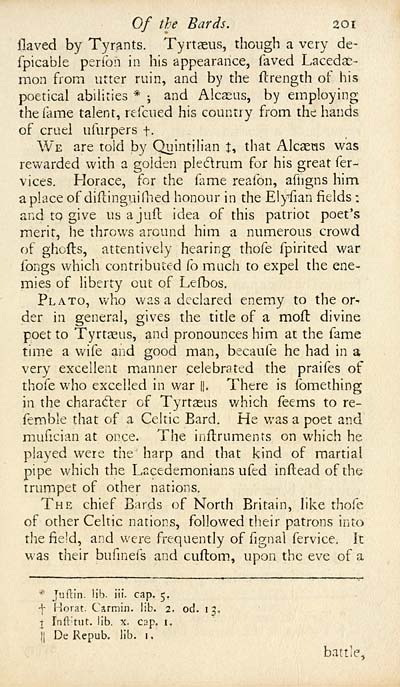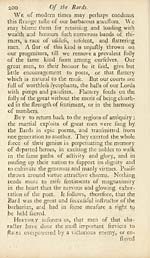Blair Collection > Critical dissertations on the origin, antiquities, language, government, manners, and religion, of the antient Caledonians, their posterity the Picts, and the British and Irish Scots
(239)
Download files
Complete book:
Individual page:
Thumbnail gallery: Grid view | List view

Of the Bards. 20 1
flaved by Tyrants. Tyrtaeus, though a very de-
Ipicable perlbn in his appearance, laved Lacedac-
mon from utter ruin, and by the ftrength of his
poetical abihries * ; and Alcaeus, by employing
the fame talent, refcued his country from the hands
of cruel ufurpers +•
We are told by Quintilian t, that Alcaews was
rewarded with a golden pledrum for his great fer-
vices. Horace, for the fame reafon, afiigns him.
a place of diflingui filed honour in the Elyfian fields :
and to give us a jufl idea of this patriot poet's
mei-it, he throws around him a numerous crowd
of ghcfts, attentively hearing thofe fpirited war
fongs which contributed fo much to expel the ene-
mies of liberty out of Lefbos.
Plato, who was a declared enemy to the or^
der in general, gives the title of a moft divine
poet to Tyrtaeus, and pronounces him at the fame
time a v/ife and good man, becaufe he had in a
very excellent manner celebrated the praifes of
thofe who excelled in war ||. There is fomething
in the charatler of Tyrtaeus which feems to re-
femble that of a Celtic Bard. He was a poet and
mufician at once. The inftruments on which he
played were the harp and that kind of martial
pipe which the Lacedemonians ufed infteadofthe
trumpet of other nations.
The chief Bards of North Britain, like thofe
of other Celtic nations, followed their patrons into
the field, and were frequently of fignal fervice. It
was their bufinefs and cuftom, upon the eve of a
* Jiiftin. lib. iii. cap. 5.
+ Horat. Carmin. lib. 2. od. 13.
1 Inft'tut. lib. X. cap. i.
jj De Repub. lib. 1,
battle.
flaved by Tyrants. Tyrtaeus, though a very de-
Ipicable perlbn in his appearance, laved Lacedac-
mon from utter ruin, and by the ftrength of his
poetical abihries * ; and Alcaeus, by employing
the fame talent, refcued his country from the hands
of cruel ufurpers +•
We are told by Quintilian t, that Alcaews was
rewarded with a golden pledrum for his great fer-
vices. Horace, for the fame reafon, afiigns him.
a place of diflingui filed honour in the Elyfian fields :
and to give us a jufl idea of this patriot poet's
mei-it, he throws around him a numerous crowd
of ghcfts, attentively hearing thofe fpirited war
fongs which contributed fo much to expel the ene-
mies of liberty out of Lefbos.
Plato, who was a declared enemy to the or^
der in general, gives the title of a moft divine
poet to Tyrtaeus, and pronounces him at the fame
time a v/ife and good man, becaufe he had in a
very excellent manner celebrated the praifes of
thofe who excelled in war ||. There is fomething
in the charatler of Tyrtaeus which feems to re-
femble that of a Celtic Bard. He was a poet and
mufician at once. The inftruments on which he
played were the harp and that kind of martial
pipe which the Lacedemonians ufed infteadofthe
trumpet of other nations.
The chief Bards of North Britain, like thofe
of other Celtic nations, followed their patrons into
the field, and were frequently of fignal fervice. It
was their bufinefs and cuftom, upon the eve of a
* Jiiftin. lib. iii. cap. 5.
+ Horat. Carmin. lib. 2. od. 13.
1 Inft'tut. lib. X. cap. i.
jj De Repub. lib. 1,
battle.
Set display mode to: Large image | Transcription
Images and transcriptions on this page, including medium image downloads, may be used under the Creative Commons Attribution 4.0 International Licence unless otherwise stated. ![]()
| Permanent URL | https://digital.nls.uk/76289240 |
|---|
| Description | A selection of books from a collection of more than 500 titles, mostly on religious and literary topics. Also includes some material dealing with other Celtic languages and societies. Collection created towards the end of the 19th century by Lady Evelyn Stewart Murray. |
|---|
| Description | Selected items from five 'Special and Named Printed Collections'. Includes books in Gaelic and other Celtic languages, works about the Gaels, their languages, literature, culture and history. |
|---|

